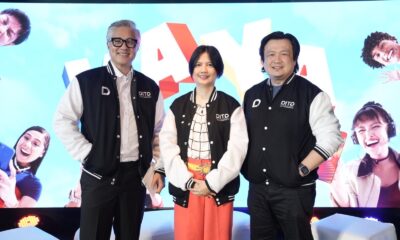NEWS
Obiena leads PH’s most productive day in SEA Games
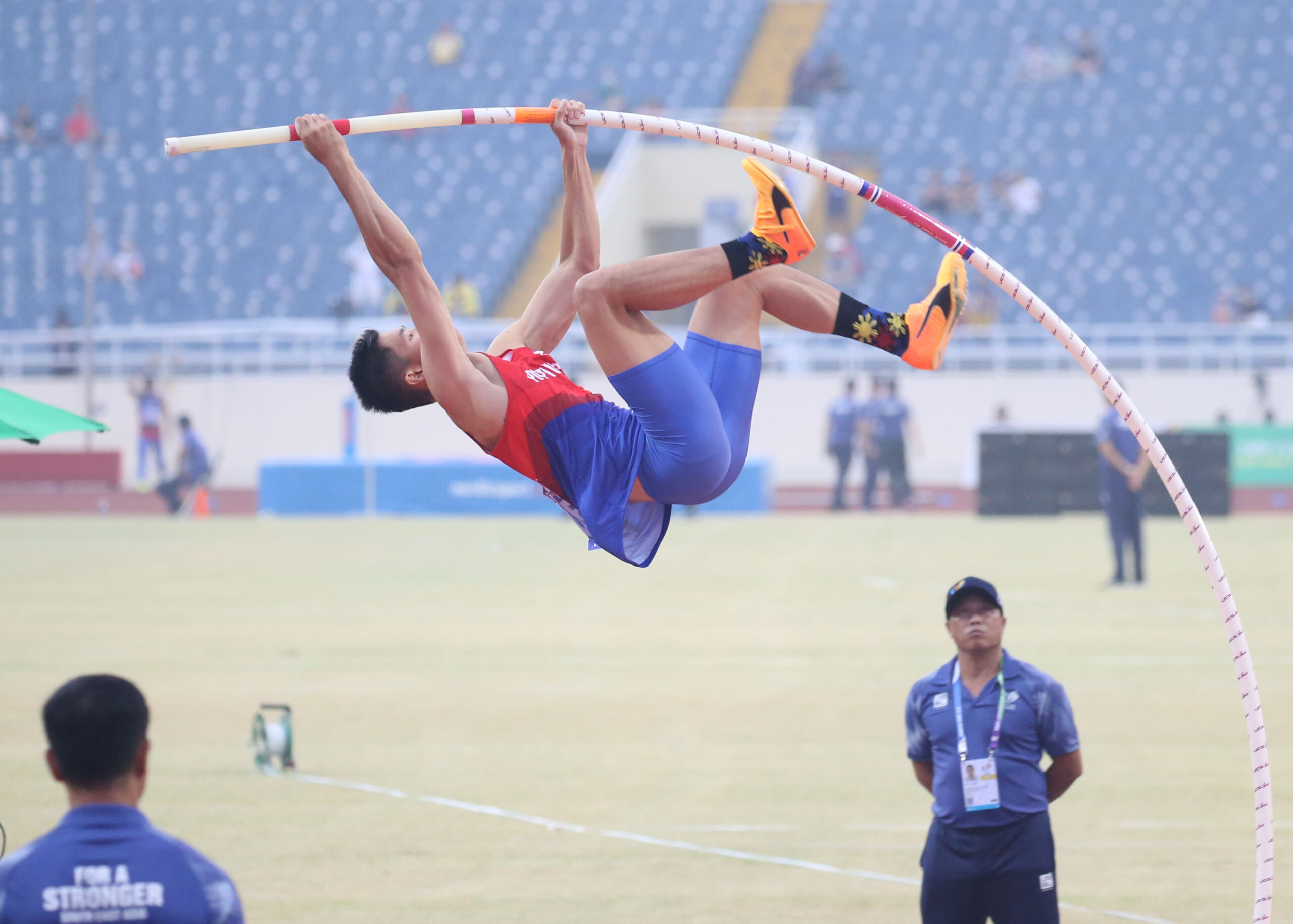
May 14, 2022 7:23 p.m.
HANOI – Olympian Ernest John Obiena easily retained his pole vault title and the Philippines, in its most productive day yet, also struck gold in triathlon, jiu-jitsu, fencing, and gymnastics Saturday to boost its bid for a top-three finish even as host Vietnam moved out of reach in the 31st edition of the Southeast Asian Games here.
Kim Mangrobang, at 30 still very much competitive, broke away from the pack in the bike leg of the 1.5K swim, 40K bike, and 10K run event and won her third straight SEA Games crown pulling away while Fil-Spanish Fernando Tan Caseres, 26, proved to be a very able successor to compatriot John Leerams “Rambo” Chicano, topping the men’s race in 1:56.57.
The twin victories, which duplicated the two-gold sweep by triathlon in the 2019 Philippine Games, started the ball rolling for the Filipinos, who also got gold medals from jiu-jitsu fighters Meggie Ochoa in the women’s minus 48kg class and Annie Ramirez in the women’s minus 62kg division and fencer Samantha Catantan in the women’s foil event.
As dusk set in, Fil-Am Aleah Finnegan, a former US national team member, led the national team to the gold medal in women’s artistic gymnastics at the Quan Ngura Sports Palace with a score of 184.500. Vietnam settled for the silver with 183.800 while Singapore was third with 182.500 points.
Finnegan also won the all-around silver medal, scoring 48.250 points in four apparatus – balance beam, floor exercise, vault, and uneven bars – with the gold going to Indon Rifda Irfanaluthfi who scored 49.650.
The last time the Philippines won a medal in women’s artistic gymnastics was in the 2001 Kuala Lumpur Games, with Pia Adelle Reyes leading the way.
The seven-gold medal haul raised the country’s total to 12, counting the gold medals retained by kickboxers Gina Iniong-Araos and Jean Claude Saclag after midnight last Friday.
Obiena, one of the world-class stars on the national team funded by the Philippine Sports Commission, found no worthy opposition and handily won the gold with a leap of 5.46 meters at the My Dinh National Stadium, his every leap lapped up by the appreciative crowd.
He tried to set a new Asian mark, raising the bar to 5.94 meters, but failed after three tries although this hardly mattered as he successfully defended his title won in a breakthrough performance in 2019 back home.
“I’m relieved and happy to win the gold. I came here as a favorite and finally delivered. Mission accomplished,” said Obiena, 26, the Asian record holder at 5.93 meters.
Pinoy athletes also added six more silver medals to the mix, two of them courtesy of triathlete Andrew Kim Remolino and wushu practitioner Agatha Wong, along with six more bronze medals for an overall tally of 12-18-17, good for fourth.
With its athletes boosted by hometown fans, Vietnam improved to 34-21-28, with Indonesia a distant second (13-16-4) and Malaysia a fighting third (13-7-20). Thailand was running a close fifth with a 10-13-25 tally.
What started out as a good day, however, ended badly for the Philippines as the Gilas men’s and women’s 3×3 teams failed to retain the crowns won in 2019, depriving the Philippines of at least two more gold medals.
The Gilas women’s team was beaten by Thailand in the semifinals, their 14-21 loss reducing some team members to tears. Thailand eventually won the gold at the expense of Vietnam while Gilas was shut out, losing to Indonesia 10-16 in the battle for third.
The quartet of Janine Pontejos, Afril Bernardino, Clare Castro, and Angelica Surada, who also lost by the same score to the vastly-improved Thai side last Friday, finished with an even 3-3 mark in the eliminations for the No. 4 spot in the semifinals, being ranged anew against the Thais.
The Thais got back at the Filipinas, who defeated them for the gold medal three years ago in the Philippine SEA Games.
The Gilas men’s team of Brandon Ganuelas-Rosser, Jorey Napoles, Marvin Hayes, and Reymar Caduyac lost to Thailand 17-21 in the semifinals and settled for the bronze after beating Indonesia 14-10.
Basketball action takes a one-day break before the start of the 5-on-5 tournament on Monday.
The Gilas Pilipinas men’s squad, backed by a mix of players from the PBA, Japan B. League, and the cadet pool of the Samahang Basketbol ng Pilipinas, arrived here early Saturday morning.
The Gilas Pilipinas women also arrived here, even going to the 3×3 tournament to support their teammates that will also be playing in the 5-on-5 battle.
Remolino of Cebu, 22, retained the silver medal he won in the 2019 Philippine SEA Games by clocking 3:59.16 while Wong, considered the face of wushu after dominating the taijiquan event in the 2017 and 2019 games, lost her grasp on the gold, scoring 9.69 points for the silver. The gold went to Alisya Mellynar of Indonesia, who scored 9.71.
The victory of the women’s gymnastics team came a day after Caloy Yulo won the men’s all-around individual title.
Yulo will be back in action Sunday, competing in the floor exercise finals where he once reigned as world champion; pommel horse and rings. The action starts at 2 p.m.
On Monday, he sees action in the vault, where he is the reigning world champion; parallel bars, and high bar.
NEWS
Rep. Atayde: No ghost projects in QC’s first district
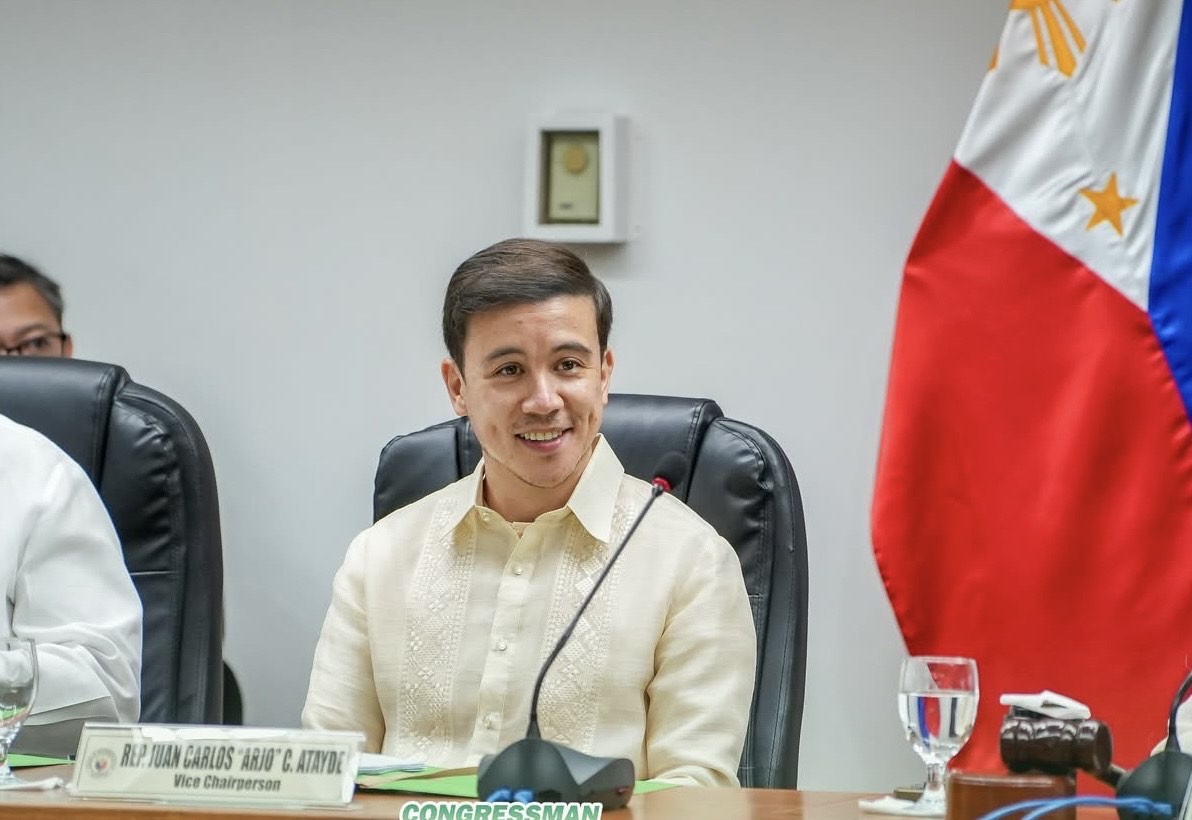
3:30 p.m. October 27, 2025
Quezon City First District Representative Juan Carlos “Arjo” Atayde reiterated that there are no “ghost projects” in his district, following a personal inspection of seven flood control and drainage projects in his district.
“There are no ghost projects with us. There’s no ghost in District One. There’s no basis for claims that these exists. Maybe there’s just a need for proper coordination so information about the projects is accurate,” Atayde said after visiting sites in Barangay Bahay Toro, Del Monte, Project 6, and San Antonio.
Atayde’s visit confirmed findings from the Department of Public Works and Highways (DPWH) Quezon City 1st District Engineering Office, which stated in a September 19 letter that “all projects are verifiable on site,” referring to the seven projects questioned due to alleged lack of coordinates.
According to the DPWH, out of 66 alleged ghost projects reported in the media, only seven were located in Atayde’s district, where all of them were found to be completed or ongoing, with proper documentation, correct coordinates, and photographic evidence.
Verified projects included four flood control structures along Culiat Creek and Dario Creek in Barangay Bahay Toro, rehabilitation of Drainage Road 3 in Project 6, the West Riverside Pumping Station in Barangay Del Monte, and a flood control structure along San Francisco River in Barangay San Antonio.
Atayde said five of the seven projects were completed, while two were suspended due to pending issues.
He also visited two additional flood control projects to assess their status – one completed along Dario Creek and one suspended along Mariblo Creek.
Atayde assured to his constituents that public funds were used properly and allegations of ghost projects are “baseless”.
“The projects are not ghosts – they can be seen, touched, and are beneficial. It looks like Halloween came early for some people,” Atayde said.
He also called on those who accused him of benefiting from these projects to verify their information first.
Atayde emphasized he couldn’t benefit from these DPWH projects as they’re already in the National Expenditure Program (NEP), and he couldn’t unilaterally include them in the General Appropriations Act (GAA) as he’s not a member of the bicameral conference committee.
“We all want to end corruption and jail the corrupt, but we won’t succeed if we punish the wrong people,” the lawmaker said.
He further reiterated the DPWH’s assertion that there are no ghost projects in Atayde’s district.
“The evidence speaks for itself, and the evidence speaks the truth,” Atayde said.
NEWS
COA uncovers more fraud in Bulacan flood control projects, files new reports with ICI
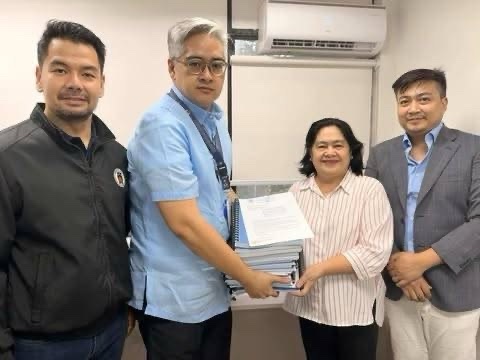
6:30 p.m. October 26, 2025
The Commission on Audit (COA) has submitted four additional Fraud Audit Reports to the Independent Commission for Infrastructure (ICI), exposing further irregularities in flood control projects managed by the Department of Public Works and Highways (DPWH) – Bulacan 1st District Engineering Office.
These reports detail cases of mismatched sites, ghost projects, and the use of substandard materials, leading to significant public funds being misspent.
SYMS Construction Trading
Balagtas River Project (P46.35 million): Despite full payment, no real construction was found at the approved site. DPWH representatives directed COA to a different location where a structure made of unsuitable materials and exposed steel bars was observed. DPWH’s own records showed 0.00% completion.
Maycapiz-Taliptip River Project (P92.59 million): This project was reported as 100% accomplished and fully paid, yet COA found no flood control structure during inspection, labeling it a “ghost project.”
L.R. Tiqui Builders, Inc. and M3 Konstract Corporation (Joint Venture)
Barangay Piel, Baliuag Project (P96.50 million): Satellite imagery revealed an existing flood control structure at the approved site even before the contract began. DPWH pointed COA to an incorrect site, where an existing structure failed to meet project specifications.
DARCY & ANNA BUILDERS & TRADING
Barangay Carillo, Hagonoy Project (P74.11 million): Despite a supposed completion date of October 3, 2024, satellite images and COA’s inspection confirmed no structure was built at the approved site.
In all cases, DPWH-Bulacan 1st DEO failed to provide crucial supporting documents to COA, hindering validation of the projects.
Individuals Held Liable
Several individuals from DPWH-Bulacan 1st DEO have been identified as liable, including District Engineer Henry C. Alcantara, Assistant District Engineer Brice Ericson D. Hernandez, and Planning and Design Section Chief Ernesto C. Galang, along with various project engineers and company representatives from the involved contractors.
Those implicated may face charges under the Anti-Graft and Corrupt Practices Act, Revised Penal Code for malversation and falsification of documents, and violations of COA Circular No. 2009-001 and the Government Procurement Reform Act.
These audit findings will support the ICI’s ongoing investigation into government infrastructure project irregularities. COA Chairperson Cordoba’s directive on August 12, 2025, initiated an immediate audit of all DPWH flood control projects in Bulacan from July 1, 2022, to May 30, 2025. This new batch of reports contributes to the 25 Fraud Audit Reports already submitted to oversight bodies, reinforcing COA’s commitment to transparency and protecting public funds, in line with President Ferdinand Marcos Jr.’s call for accountability. Additional reports are expected as the audit continues.
NEWS
DITO delivers superior network performance, turning digital aspirations into possibilities
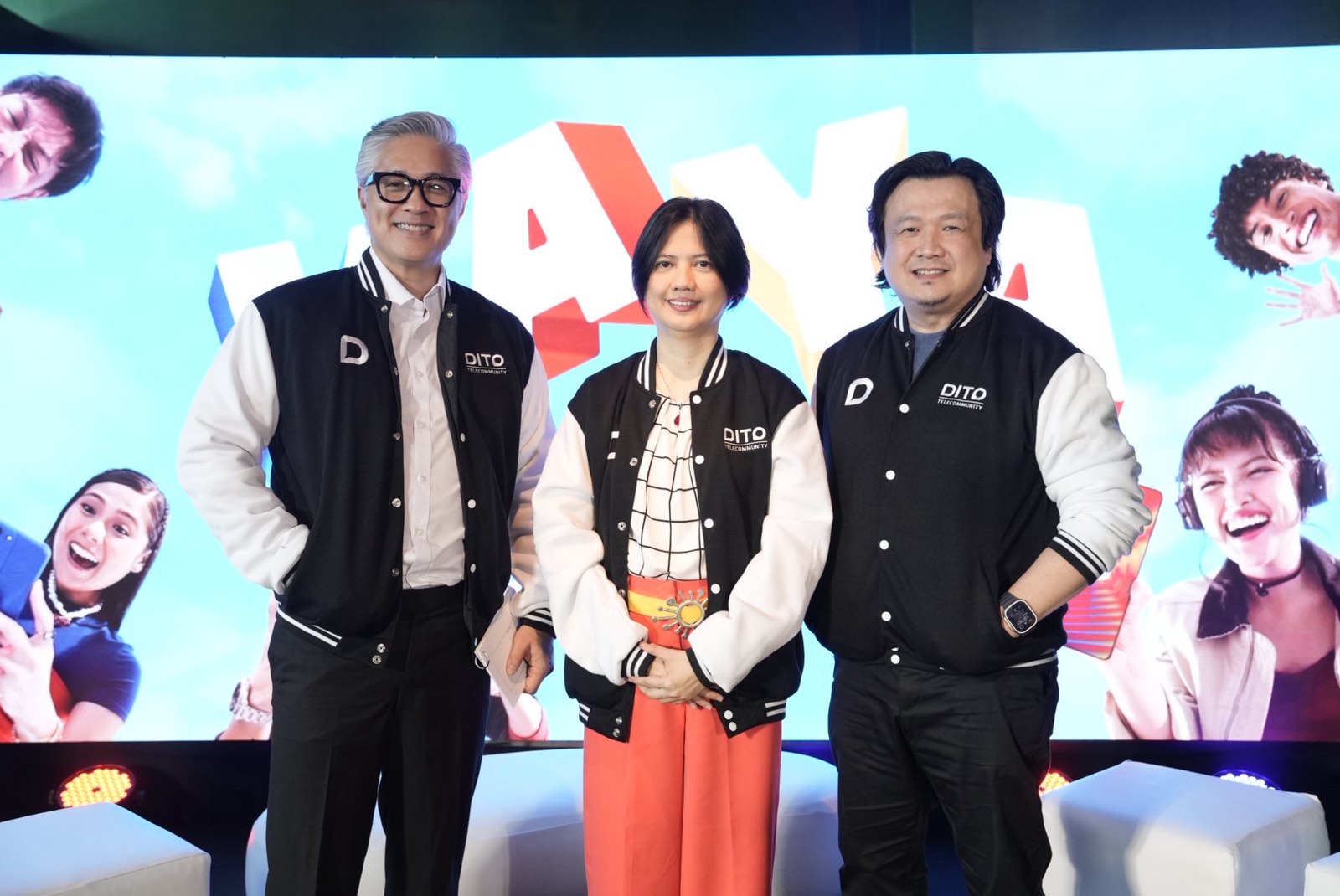
8:11 p.m. August 28, 2025
DITO Telecommunity showcased how superior connectivity transforms Filipino digital aspirations into achievable realities during the successful media launch of the telco’s latest campaign, Kaya DITO, held at Manila House, Bonifacio Global City, Taguig.
Built on True 5G standalone technology and as validated by a global leader in mobile analytics and insights, Opensignal, as the Philippines’ Fastest Mobile Network, DITO’s ecosystem proves that the Filipino telecommunity’s demand for seamless network connectivity, value-driven services and unified digital experience aren’t distant possibilities, but today’s basic expectations—this challenges what the telco industry has long normalized.
“For too long, outages, dropped calls, and overpriced data have been treated as normal. Let us say it bluntly: It is not normal. Every Filipino has limitless potential when equipped with the right tools, and the game is now changing since DITO has joined the fray and taken up the cause to disrupt the status quo—to deliver inclusive, next-gen technology to the Filipino people. “Kaya DITO!” is our battle cry to symbolically break that cycle, because we truly believe that Filipinos deserve better,” shared by DITO Telecommunity President Eric Alberto in the event.
The Telco that Truly Takes Care of its Users
DITO’s prepaid solutions eliminate the frustration of wasted data through Level-Up Packs with ViLTE technology, making DITO the primary telco offering unlimited DITO-to-DITO HD video calls and unli mobile calls. Combined with Viber and Prime Video inclusions and flexible data packages with longer validity periods, users can now maximize their every peso without worrying about abruptly expiring data allocations.
The Telco that Offers Value-Packed Postpaid Plans
DITOFlexPlan 888 redefines what postpaid should offer—comprehensive inclusions and generous data at prices that make sense for Filipino budgets. Whether you choose SIM-only or device bundles, these plans prove that premium network performance doesn’t have to break the bank, empowering users to pursue their goals without connectivity compromises.
The Telco that Brings True 5G Home Internet Convenience
DITO WoWFi Pro 365 makes home connectivity effortless with a year-long unlimited connection that works when you need it. Families enjoy the convenience of reliable internet for work, study, and entertainment without the inconvenience of data top-ups and complicated installations; just network performance that simplifies your digital life at home. Just ask any of your relatives and friends who have already ditched ordinary WiFi and jumped onto WoWFi— they will tell you what you’ve been missing out on.
The Telco that Built Everything You Need in One App
The DITO App represents one of the industry’s most comprehensive digital platforms, built from the ground up to handle the entire customer journey. From SIM and load purchase to account management and a wide range of OTT apps, users enjoy complete digital control with custom special offers, DITO Rewards points, and 24/7 customer support—managing everything while earning exclusive benefits.










